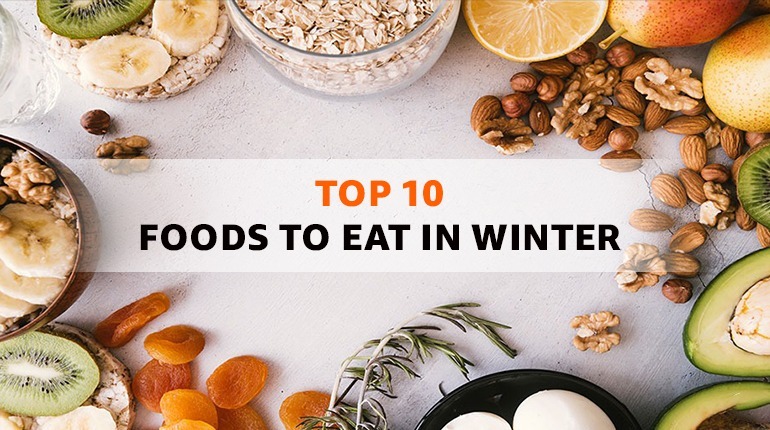10 Must-Eat Winter Season Foods to Keep You Warm

The winter months are upon us, bringing colder temperatures and shorter days. While snuggling under a blanket with a hot beverage might sound tempting, it’s more important than ever to prioritize your health and well-being. The key to a thriving winter lies not only in staying warm but also in fueling your body with the right nutrients. Forget light salads! Winter calls for hearty, meals that keep you feeling warm and energized. This guide dives into delicious winter season food that will nourish your body and boost your health throughout the cold months.
1. Leafy Greens:
First, leafy greens like spinach, kale, and collard greens are packed with essential vitamins and minerals, including vitamins A, C, and K, which are crucial for boosting the immune system and protecting against winter illnesses. They are also rich in antioxidants that help fight free radical damage and promote overall health.
2. Root Vegetables:
Next, root vegetables like carrots, beets, potatoes, and turnips are not only delicious but also a great source of vitamins, minerals, and fiber. This winter season food is naturally warming and comforting, making them ideal for winter meals. These vegetables are also a good source of beta-carotene, which is converted into vitamin A in the body and helps maintain healthy skin and vision.
3. Citrus Fruits:

Citrus fruits like oranges, grapefruits, and lemons are a wintertime staple for a reason. Further, they are brimming with vitamin C, a powerful antioxidant that helps support the immune system and fight off illness. Additionally, citrus fruits are a refreshing and healthy way to stay hydrated during the dry winter months.
4. Vitamin D-Rich Foods:
Vitamin D is essential for bone health and immune function, but it can be difficult to get enough during the winter months when we spend less time outdoors in the sun. To ensure adequate vitamin D intake, consider incorporating vitamin D-rich foods into your diet, such as fatty fish (salmon, tuna, mackerel), egg yolks, and fortified milk.
5. Beans:
Beans are a great source of protein, fiber, and essential nutrients like iron, zinc, and magnesium. They are a hearty and filling addition to winter meals and can help keep you feeling energized throughout the day.
6. Low-Sodium Soups:

Soup is a quintessential winter food that is both comforting and nutritious. Opt for low-sodium soups made with fresh ingredients and packed with vegetables like carrots, celery, and spinach. You can also add protein, such as chicken or lentils, to make the soup even more filling.
7. Whole Grains:
Whole grains like brown rice, quinoa, and oats are a great source of complex carbohydrates, which provide sustained energy and keep you feeling full for longer. This sort of winter season food is also a good source of fiber, which promotes digestive health and helps regulate blood sugar levels.
8. Berries:
Next, berries are a delicious and nutritious addition to your winter diet. They are packed with antioxidants and vitamins, including vitamin C, which helps boost the immune system. Berries can be enjoyed fresh, frozen, or dried.
9. Nuts and Seeds:

Next, nuts and seeds are a great source of healthy fats, protein, fiber, and essential nutrients like magnesium, zinc, and selenium. They are a convenient and portable snack option and can also be added to cereals, salads, and yogurt.
10. Fermented Foods & Spices
Lastly, include fermented foods like yogurt, kimchi, and sauerkraut in your diet to promote gut health. A healthy gut microbiome plays a crucial role in overall health and immunity. Warm your winter meals with spices like cinnamon, ginger, and turmeric! These delicious additions also offer health benefits: ginger fights inflammation, turmeric has antioxidants (curcumin), and cinnamon helps regulate blood sugar.
Additional Tips for Healthy Winter Eating:
- Stay hydrated by drinking plenty of water and herbal teas.
- Limit your intake of processed foods, sugary drinks, and unhealthy fats.
- Get regular exercise to boost your mood and energy levels.
- Cook more meals at home using fresh, seasonal ingredients.
Conclusion
Thus, by incorporating these must-eat healthy winter season food into your diet, you can give your body the nutrients it needs to stay healthy and strong throughout the cold season. Remember, a healthy diet is essential for maintaining a healthy weight, boosting your immune system, and fighting off winter illnesses. So, make sure to stock up on these nutritious foods and enjoy the winter season!
Also Read: 8 Easy Steps to Incorporate a Daily Walk into Your Busy Routine
